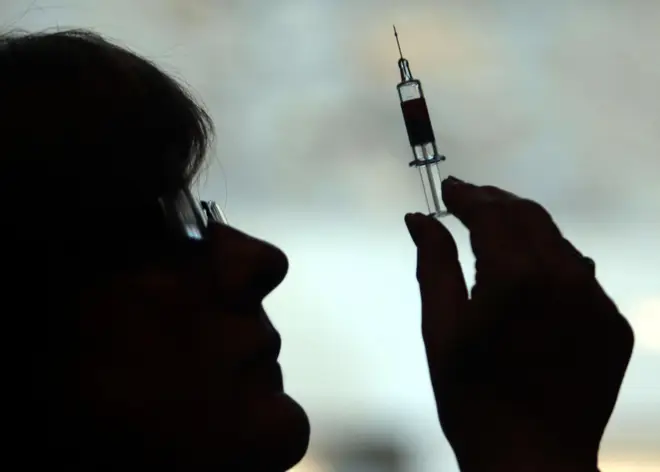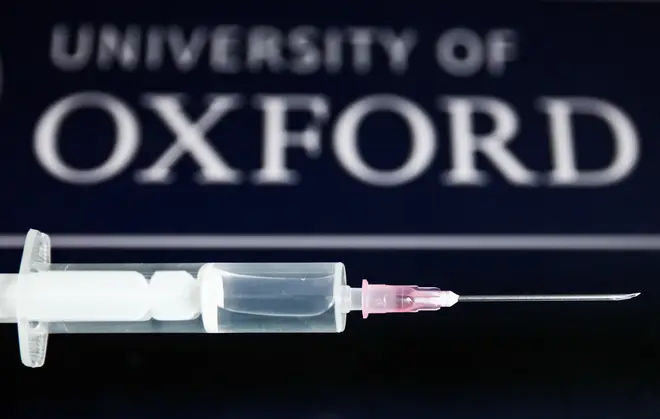
Nick Ferrari 7am - 10am
23 October 2020, 06:37

The coronavirus vaccine being developed at Oxford University is "doing everything expected" and "provokes strong immunity", according to a new study.
The vaccine, which many hope will be able to beat Covid-19 in the new year, is understood to trigger an immune response in volunteers who took part in the trials.
David Matthews, an expert in virology from Bristol University, who led the research, said the vaccine is "doing everything we expected."
Read more: ‘Human challenge’ study will see patients infected with covid-19 for vaccine research
Read more: Volunteer in Oxford vaccine trial placebo control group dies from covid in Brazil
He said: “This is an important study as we are able to confirm that the genetic instructions underpinning this vaccine, which is being developed as fast as safely possible, are correctly followed when they get into a human cell.
“Until now, the technology hasn’t been able to provide answers with such clarity, but we now know the vaccine is doing everything we expected and that is only good news in our fight against the illness.”

These instructions detail how to make the spike protein from SARS-CoV-2, the virus that causes Covid-19.
Once the spike protein is made, the immune system reacts to it, pre-training the immune system to identify a real Covid-19 infection.
It means that when a person who is vaccinated is confronted with SARS-CoV-2, their immune system is pre-trained and ready to attack it.
Read more: Covid vaccines should be available early next year, doctor tells Lionel Barber
Read more: Chinese coronavirus vaccine candidate safe, early results suggest
Sarah Gilbert, Professor of Vaccinology at the University of Oxford and lead on the Oxford vaccine trial, said: “This is a wonderful example of cross-disciplinary collaboration, using new technology to examine exactly what the vaccine does when it gets inside a human cell.
“The study confirms that large amounts of the coronavirus spike protein are produced with great accuracy, and this goes a long way to explaining the success of the vaccine in inducing a strong immune response.”

""We have two strong candidates for the vaccine," taskforce medic says
It comes after Sir Patrick Vallance said a Covid-19 vaccine is "unlikely" to fully stop the spread of the virus.
The Government's chief scientific adviser said that only one disease - smallpox - had ever been completely eradicated.
He said that in future, treating Covid-19 may become more like seasonal flu.
"I think it is unlikely that we will end up with a truly sterilising vaccine that completely stops infection," he said.
"It is likely that this disease will circulate and be pandemic. My assessment - and I think that's the view of many people - is that's the likely outcome.
"Clearly as management becomes better, as you get vaccination that will decrease the chance of infection and the severity of the disease - or whatever the protocols of the vaccines are - this then starts to look more like annual flu than anything else and that may be the direction we end up going in."
Sir Patrick said that over the next few months it will become clear whether there are any vaccines that do protect, and how long for.

Vaccine trials: how do they work and when could we see results?
And speaking at a Downing Street press briefing, he said it was too early to speculate about how effective a vaccine might be.
He instead said the aim would be for a vaccine to allow the "release" of measures such as social distancing and mask-wearing.
"That's got to be an aim that we would all wish for and that's why so many companies around the world are working on vaccines and why there has been such remarkable progress," he said.
"Things are progressing well, there are vaccines that produce an immune response, they're in phase three clinical trials, we should be seeing some data read-outs over the course of this year, but I remain of the view that the possibility of wider-spread use of vaccines isn't going to be until spring or so next year by the time we get enough doses and enough understanding of the outputs to use them.
"Now we may get a few doses this side of Christmas, maybe something could happen, but I think we should more realistically be looking at spring, and of course there are no guarantees until the studies have read out."